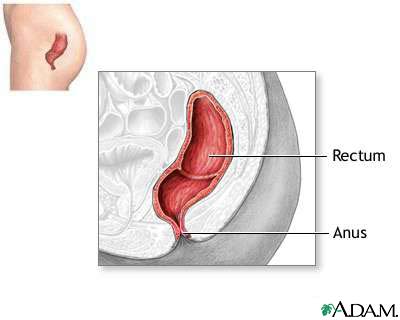Treatment
Most fissures heal on their own and do not require treatment, aside from good diaper hygiene in babies.

However, some fissures may require treatment. The following home care methods usually heal most anal fissures.
* Cleansing more gently
* Diet changes — eating more bulk, substances that absorb water while in the intestinal tract
* Muscle relaxants applied to the skin
* Numbing cream, if pain interferes with normal bowel movement
* Petroleum jelly applied to the area
* Sitz bath
* Stool softeners
If the anal fissues do not go away with home care methods, treatment may involve:
* Botox injections into muscle in the anus (anal sphincter)
* Minor surgery to relax the anal muscle
Prognosis (Expectations)
Anal fissures generally heal quickly without further problems. However, people who develop fissures are more likely to have them in the future.
Complications
Occasionally, a fissure becomes chronic and will not heal. Chronic fissures may require minor surgery to relax the sphincter.
Calling Your Health Care Provider
Call your health care provider if symptoms associated with anal fissure are present, or if the fissure does not heal appropriately with treatment.
Anal fissure: Overview, Causes
Anal fissure: Symptoms & Signs, Diagnosis & Tests
Anal fissure: Treatment
Reviewed By : Jenifer K. Lehrer, MD, Department of Gastroenterology, Frankford-Torresdale Hospital, Jefferson Health System, Philadelphia, PA. Review provided by VeriMed Healthcare Network. Also reviewed by David Zieve, MD, MHA, Medical Director, A.D.A.M., Inc.
